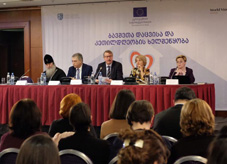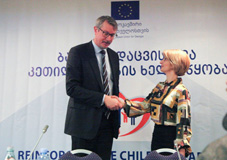
EU project for vulnerable children in Georgia
By Gvantsa Gabekhadze
Thursday, February 21
The European Union representation in Georgia has announced the launch of a new, three-year project which aims to help the government of Georgia provide quality care for the vulnerable children, those deprived of parental care.
The project will bring together all the stakeholders from the government, the non-governmental field and from the Georgian Patriarchate to address the needs of the category of children.
The project will be implemented by the World Vision Georgia NGO and the governmental Social Service Agency.
EU Ambassador to Georgia Carl Hartzell stated that much has been done in the country to address the requirements of the vulnerable children. However, much is still to be done.
Hartzell stated that the closure of the state-run, large-scale residential buildings for vulnerable children and replacing them with family-style small group homes and foster care families was a big achievement.
“Between the years 2009-2013, the Georgian government has successfully closed down almost all state-run large-scale residential institutions and comparatively increased number of the established family-style small group homes and foster care families opened the doors for thousands of vulnerable children to alternative care services.
“The lack of family support services and the absence of prevention mechanisms in place as well as an unbalanced approach towards different groups of children remain as the main challenge of the ongoing reform,” the EU in Georgia says.
Minister of Internally Displaced Persons from the Occupied Territories, Labor, Health and Social Affairs David Sergeenko thanked the European Union and World Vision for launching the project and expressed the hope that the initiative will be a step forward towards improving conditions for vulnerable children in Georgia.
The World Vision director Rka Zhvania stated that “this is one of the first large- scale initiatives that requires the unification of the will and effort of the government, non-governmental sector and the Georgian Patriarchy to improve the quality and welfare of the most vulnerable children and families.”


